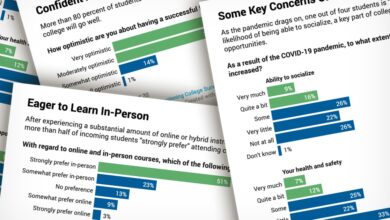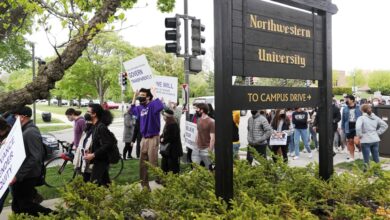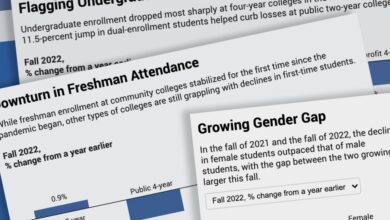A University Resisted Pressure to Cancel a Controversial Speaker. But It Moved the Event Online.

[ad_1]
The State University of New York College at Brockport has spent the past two weeks painstakingly explaining why the institution is committed to hosting a controversial speaker on its campus. But amid pushback from Republican state lawmakers and New York police organizations, along with protests by the public, university officials have moved the April 6 event online.
The speaker is Jalil Muntaqim, a former Black Panther convicted of murdering two police officers in an ambush attack in 1971. Muntaqim, who previously went by the name Anthony Bottom, spent nearly 50 years in prison, and became an educator and activist. He was released on parole in 2020.
University officials cited “safety concerns” as the reason for the change. They haven’t yet shared specific plans for the virtual program.
Muntaqim was invited by Rafael Outland, an assistant professor in the department of counselor education at Brockport. The event is titled “History of Black Resistance, U.S. Political Prisoners & Genocide: A Conversation with Jalil Muntaqim.”
Jonathan Friedman, the director of free expression and education at PEN America, a human-rights association of writers and editors, said in an interview that he is concerned about what the university’s decision means for the politicization of higher education.
“This is a set of steps taken by the university to treat this event as though it were trying to diminish it or lessen its impact,” he said. “At what point do all of these changes to the plan have an impact on what he says or who comes to hear him?”
Muntaqim’s planned visit brought mixed reviews, both on and beyond Brockport’s campus. Last week, under pressure from New York City’s police union and state Republican lawmakers, the university announced that it would no longer be paying Muntaqim for the event, but that his visit was still on.
While some were outraged that a convicted felon had been asked to speak on campus, others remained interested in what Muntaqim might say, Heidi Macpherson, the university’s president, said in a statement.
She said that while SUNY-Brockport doesn’t support violence, the institution believes in freedom of speech and hopes listeners gain a new perspective from a difficult conversation.
“SUNY-Brockport has routinely held speaking events involving controversial speakers from various background and viewpoints, and will continue to do so,” Macpherson said. “These conversations are uncomfortable. They are meant to be.”
The event had initially received funding through a “Promoting Excellence in Diversity Grant,” according to Damita Davis, the university’s chief diversity officer. But a campus committee rescinded the grant, saying the program would no longer provide funding for the speaker.
“We will be pausing the PED grant program while a thorough review and revision of the grant-application process can take place,” Davis said in a statement on the university’s website.
Instead, a private donor would pay Muntaqim for his appearance, WROC-TV/RochesterFirst reported. Then that decision was reversed, too.
In anticipation of possible protests, the university warned of a large police presence on campus on the day of the event and told students they had the option of skipping classes on April 6. But now, Muntaqim won’t come to campus at all.
SUNY-Brockport’s handling of the Muntaqim talk sets a concerning precedent for how faculty members, students, and others are expected to use money that’s available for campus events, Friedman said. To him, it suggests that “centralized university bodies should have absolute power to override decisions that everybody else is making.”
While the university said its main reason for moving Muntaqim’s speech online was campus safety, Friedman said that political pressures seemed to play a large role in chipping away at the intended trajectory of the event.
“It’s obvious that the decision to defund the event and re-evaluate how funding is proportioned is directly tied to politicians’ telling this public university that they don’t like what it’s doing,” Friedman said.
While the university continues to stress its commitment to “academic freedom including diversity, equity, and inclusion,” Friedman worries that its actions suggest otherwise.
“The goal has to be for universities not to run away from hosting controversial and difficult conversations just because one group thinks that some person is not entitled to their platform,” he said.
[ad_2]
Source link






